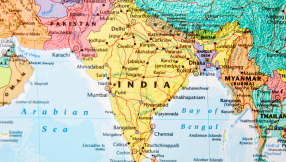A Chinese bishop has been arrested by police and removed from his diocese in a city with a thriving Christian population.
Bishop Peter Shao Zhumin, coadjutor bishop of Wenzhou, was detained by authorities last week.
According to Asia News, which is affiliated with the Catholic Church, the bishop was set to take over from Bishop Vincent Zhu Weifang, who died from cancer on Wedneday.
The Chinese authorities do not recognise Bishop Shao's leadership because he is not part of the government's state-approved Catholic body, and was instead appointed by the Vatican.
Relations have historically been strained between the Catholic Church and China's ruling Communist party over irreconcilable claims to authority. The Vatican does not accept the validity of episcopal consecrations by the Chinese Catholic Patriotic Association, and an underground Catholic Church refuses to compromise with the state and is loyal only to the Pope.
Bishop Shao was reportedly taken from his diocese to northwestern China "on a trip" and another priest is being held in detention in relation to his arrest.
According to AsiaNews, police have barred members of the underground Catholic church from attending Bishop Vincent's funeral.
Wenzhou is in China's eastern Zhejiang province and is known as the 'Jerusalem of the East' for reportedly having the largest Christian community in the country.
Zhejiang has been the centre of a government campaign that has seen 1,700 churches demolished or had their crosses removed.
The Communist party is believed by human rights campaigners to be becoming progressively more worried about the influence of Christianity in the country.
President Xi Jinping has called on China to return to traditional beliefs, such as Confucianism, rather than 'western' religions, and has introduced a hard-line approach to various parts of civil society, including religion.













